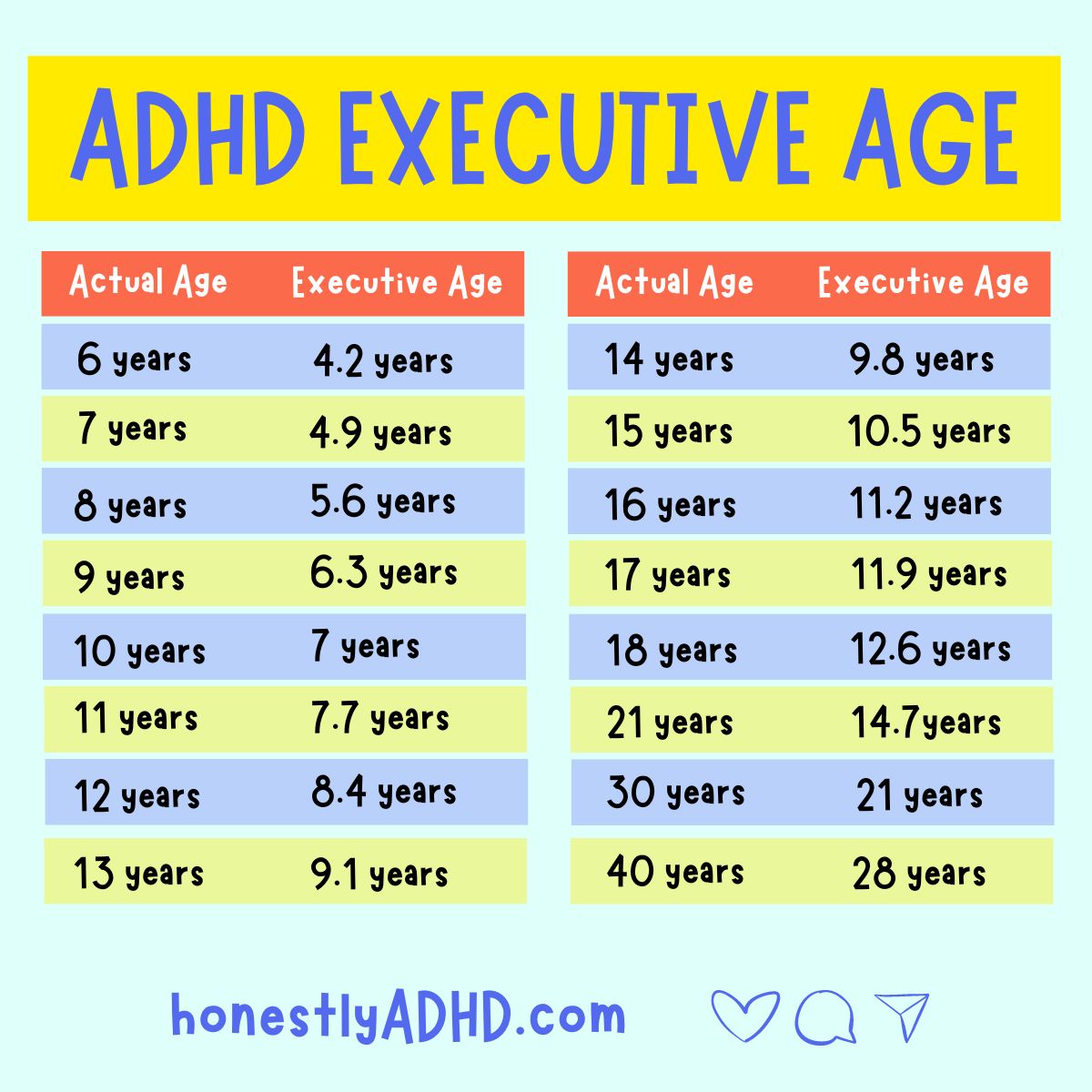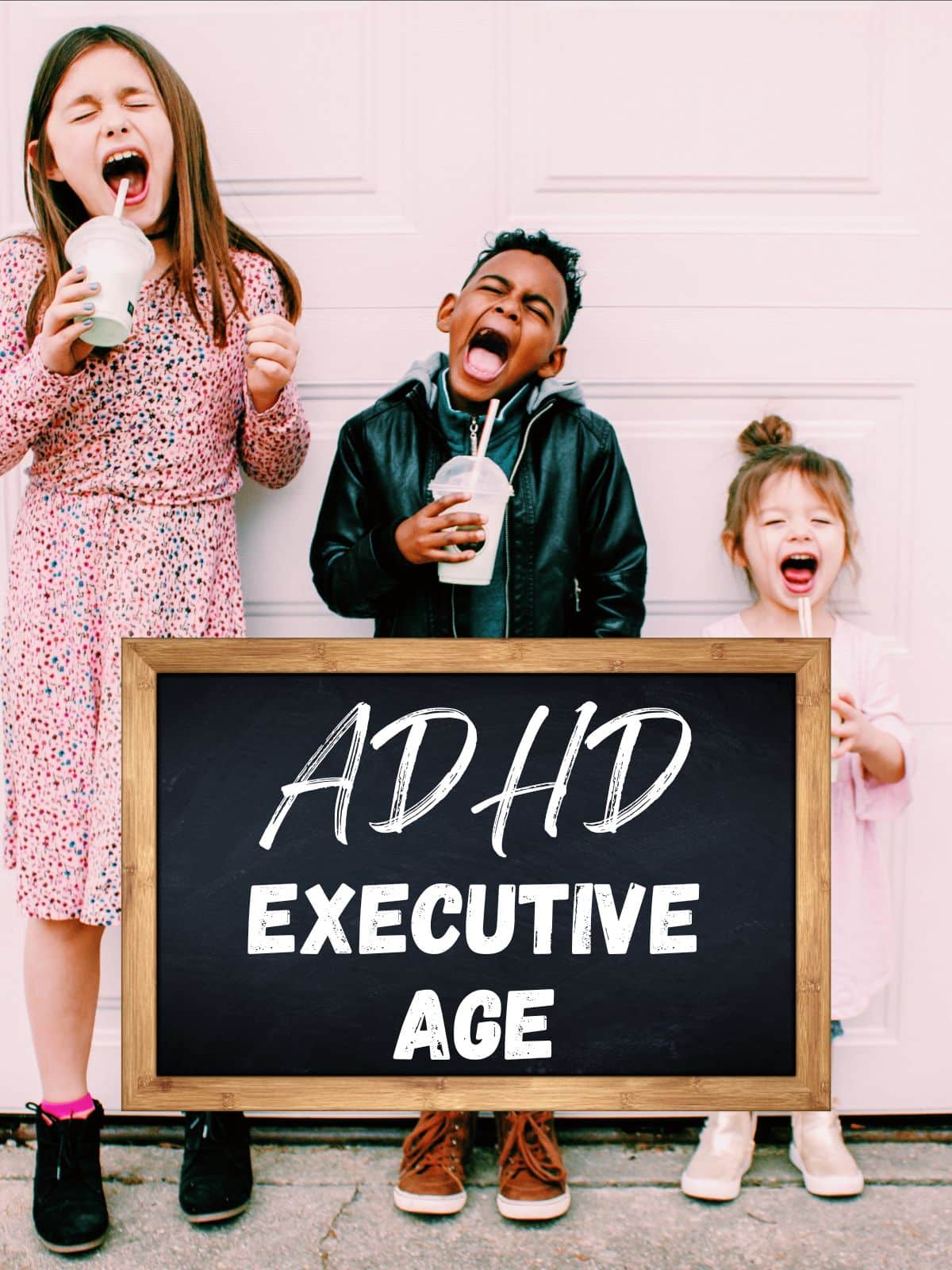The content on this website is for informational purposes only and is not meant to replace professional or medical advice. See our full disclaimer.
If you're reading this, ADHD is likely a part of your daily life. We're about to add another layer to your understanding. Let's talk about something called the ADHD executive age.
This article is going to help you understand what executive age is and how to create a nurturing environment for your ADHD child.
Jump to:
Understanding ADHD Executive Age
When we talk about executive age, we're referring to how an individual's executive functions work.
According to leading ADHD expert Dr. Russell Barkley, kids with ADHD are typically about 30% behind their peers in this area.1Essential Ideas for Parents by Dr. Barkley
That means their mental age is behind their actual age.
Executive functions are the skills we use to focus, remember instructions, plan, and juggle multiple tasks.2Diamond, A. (2013). Executive functions. Annual review of psychology. These skills include working memory, emotional control, and emotional maturity.
What does this mean for you and your child? Your child is just as brilliant, just as unique as any other, but their brain works differently, and that's perfectly okay.
Whether you're a parent of an ADHD child or an ADHD adult, we need to change our expectations and offer the necessary support.
ADHD Maturity Chart
Here's a chart you can reference when following the ADHD 30 rule. It's interesting to note how the maturity gap widens.
| Actual Age | Executive Age |
|---|---|
| 6 years | 4.2 years |
| 7 years | 4.9 years |
| 8 years | 5.6 years |
| 9 years | 6.3 years |
| 10 years | 7 years |
| 11 years | 7.7 years |
| 12 years | 8.4 years |
| 13 years | 9.1 years |
| 14 years | 9.8 years |
| 15 years | 10.5 years |
| 16 years | 11.2 years |
| 17 years | 11.9 years |
| 18 years | 12.6 years |
| 21 years | 14.7 years |
| 30 years | 21 years |
| 40 years | 28 years |
Your child's executive dysfunction may affect their problem solving skills, attentional control, and change the speed at which they learn new things. ADHD adults also need to cut themselves some slack, as our brains just work differently.
Here's a shareable version of the mental age chart:

A Closer Look at Executive Functions
Here's a brief look at how executive function can affect people with ADHD as they age, keeping the ADHD 30% rule in mind:3ADHD Through Different Developmental Stages
1. Baseline or Pre-Executive Function Stage (From Birth): Toddlers start to learn basic self-control and self-awareness. For a child with ADHD symptoms, transitions might be a bit trickier, and tantrums may be more frequent. They're still learning, just at their own pace.
2. Instrumental or Self-Directed Abilities Stage (Early Childhood): Kids begin to develop self-control and can follow simple instructions. A child with ADHD might forget what they were asked to do or get distracted halfway through.
3. Methodical or Self-Reliant Abilities Stage (Elementary School Years): Children start to plan and think ahead. A child with ADHD might forget to do their homework or lose track of time.
4. Tactical or Reciprocal Abilities Stage (Middle School Years): Kids start understanding other people's perspectives. A child with ADHD may struggle with impulsivity and seeing things from others' viewpoints.
5. Strategic or Cooperative Abilities Stage (Early Adult Years or by Age 21): Young adults set long-term goals and make plans. A person with ADHD might struggle with long-term planning or get overwhelmed by complex tasks.
Behavioral Inhibition and Its Importance
According to Dr. Barkley, one of the central aspects of executive functioning is behavioral inhibition.4Behavioral inhibition, sustained attention, and executive functions: constructing a unifying theory of ADHD This is the ability to stop, think, and then act. It's a skill that's particularly essential for kids with ADHD, as it can be quite challenging for them.
This means we might not want to give a 15-year-old ADHD teen the same responsibilities as their peers, as according to the ADHD mental age chart, their executive age is 10.5.
A 12-year-old ADHD kid (executive age of 8.4) may require more help finishing their homework. A 5 year old may struggle to learn how to ride a bike or tie their shoes, as their executive age is 3.5.
Check out this video of Dr. Barkley describing the ADHD 30 rule.
Supporting Your ADHD Child
With this understanding, you can better help your child navigate their world. This will improve their confidence and overall mental health. Here are some strategies to get you started:
- Keep the praise coming.
- Make problem-solving hands-on and step-by-step.
- Break down big tasks into smaller ones (one of our 8 Task Initiation Strategies).
- Timing is crucial when giving instructions.
- Encourage emotional expression and management.
- Promote physical exercise and a healthy diet.
- Encourage small breaks and relaxation.
- Use positivity and rewards.
- Talk to your child's doctor to see if therapy or medication can help
Above all, be patient, be kind, and be there for them. As they grow, their ability to use their executive functions will, too.
Changing the Perspective
ADHD isn't about a lack of skills. It's about a different way of processing and performing tasks. A task that's interesting, rewarding, or new? That's an ADHD brain's jam! Help them set goals, reward good behavior, and remember: their executive age might be a bit behind their actual age.
And remember, every child is unique. They grow and develop at their own pace. So, even if they might be a bit behind in some areas, they could be ahead in others. Let's celebrate their uniqueness and help them shine in their own way!
Adjust your expectations and embrace their unique view of the world. Celebrate every achievement, offer support when needed, and remember that your love and understanding are the most precious gifts of all.
References:
- 1
- 2
- 3
- 4






Doug Kahn says
ADHD people with Dyslexia have a global view. People with normal brains think local. Dyslexics & ADHD people who can do both are branded “Geniuses”. Have people with ADHD convince others of the big picture, while having others fill them in on the details.
Honestly ADHD team says
Thank you for your comment! Very interesting, we're going to dig more into this!